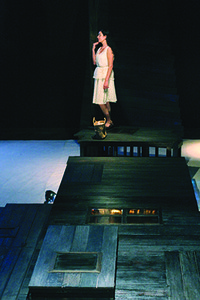
LIGIA JARDIMActress Alejandra Sampaio, one of the founders of Velha Companhia LIGIA JARDIM
Opened in the 1940s and closed in 1994, for decades the Cândido Mendes Penal Colony kept tourism away from Ilha Grande, off the coast of Rio de Janeiro, except for one specific profile of traveler: soldiers, who would spend their holidays there.
The son of a colonel, theater director Kiko Marques also had that privilege. He recounts that in 1973, at age nine, he began to travel there in the summer. It was the same routine every year, and it continued into adulthood.
And it was not only adulthood. In 2006 he began the process of writing a play entitled Cais ou da indeferença das embarcaçoes (Piers or the Indifference of the Boats), a little lampoon on the passage of time, now playing at the Capobianco Institute until the 15th of the month.
Small and cozy, this year the show highlighted Velha Companhia, directed by Marques. The word spread and the show was sold out until the end of the first season, which began in October 2012 and continued until March 2013. Curators and critics paid attention.
The work received nominations in six categories for the Shell Award and it emerged as a favorite for the awards; the winners will be announced next March. And so the decision was made to schedule more performances in the same theater, where there is a chance that it will continue into 2014.
There are 12 actors and two musicians on the stage, including a veteran actor– Walter Portela, discovered by Antunes Filho in the 1970s– who had vanished from the theatrical scene.
The set is very simple, with nothing more than a wooden pier. The audience is in a circle around it, very close to the performers. Cais is one of those plays in which sighs are clearly just as important for the scene as gunshots.
Live music sets the tone for the sounds of a village far from city life, touched at times by the beauty of its idyllic landscapes, and at times by boredom or by the conflict of the coexistence of a small population isolated by the waters of the sea.
The play is almost three hours long and is divided into two acts, as three generations of a family with their relatives spend time around the pier. Sons become fathers and singles marry. The passage of time is not chronological and it jumps back to the past. The landscape also changes; not much, but it does change with the advent of progress.
The changes are linked to Marques’ own personal experiences. He saw the island change dramatically and he saw the prison close. Sardines became scarce in the sea around the island, companies that used to can fish left the area, and tourism grew.
“Every time I came back, something was different,” says the director. “I remember a time when we caught lobsters along the beach,” he says. “I remember seeing Madame Satã in the last years of her life,” he reminisces, referring to the illustrious former inmate who was released from prison and stayed on the island as a resident.

LIGIA JARDIMVeteran actor Walter Portela and actress Rose de OliveiraLIGIA JARDIM
To this experience he added a series of interviews with residents of the island and spent two months collecting tales. He preferred not to use a recorder for the conversations. “I disliked interviews and was afraid of them,” says the director. “I didn’t want anything formal because formality detracted from the conversation,” according to his analysis.
The original intention of establishing a dialogue with documentary art was moving in new directions. “I realized that the language should be more poetic. None of the stories in the show are completely true, and none are totally false,” he explains.
In the play, for example, there are references to the suicide of a woman. She was married and allegedly involved with an inmate, and her death reportedly had something to do with romance or slander against adulterous women, but the director does not know for sure. “I am no longer able to distinguish the truth,” he says.
And so what remains of the interviews? Perhaps a duel between the culture of fishermen and the reality imposed by the strong presence of the prison. But it is the love affairs that represent this conflict, with scenes that always conclude with year-end celebrations.
“What we see through the play are humans caught in that uneasy space between their most pure intentions and their most egotistical and perfidious acts,” says the director. “They want to follow their conscience but they are influenced by the tides and storms, and there is a limit that cannot be defined between the external and the internal. The play is basically about the gap between what humans say and what they do.”
Companhia Velha, now 10 years old, has previously experimented with creating a play based on a documentary investigation process. In 2005 and 2006, the group, also founded by Alejandra Sampaio and Virginia Buckowski, presented Crepúscolo (Twilight), a play about people living together in Retiro dos Artistas, a type of residence for seniors in Rio de Janeiro.
It is also a genre that has been gaining strength on the Latin American scene. In recent years, there have been similar performances in the city of São Paulo that originated in Argentina, Chile and Uruguay. There was, for example, Discurso de um hombre decente (Discourse of a Decent Man) from Colombia, by the Mapa Teatro Company, presented in São Paulo in July. The play investigated drug trafficking relationships in Colombia and was based on interviews as well.
However, Velha Companhia mentioned that it will change course for its next play. Marques did not discuss the next project, but he promises that it will be based on a totally different process “even though the focus of the text continues to be dramaturgical creation.” Stay tuned.
Republish